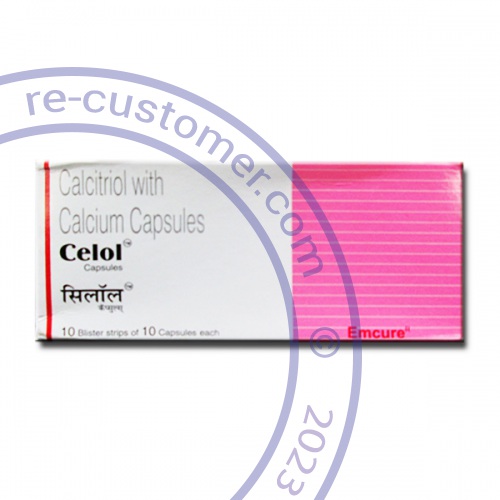
Brand(s): Celol®
Manufacturer: Emcure
Disease(s): Calcium Deficiency
| Package | Price | Per tablet | Savings | Order |
|---|---|---|---|---|
| 500mg × 180 tablets | £ 52.06 | £ 0.29 | £ 148.65 | Add to cart |
| 500mg × 120 tablets | £ 74.38 | £ 0.62 | £ 59.42 | Add to cart |
| 500mg × 90 tablets | £ 63.22 | £ 0.70 | £ 37.14 | Add to cart |
| 500mg × 60 tablets | £ 48.34 | £ 0.81 | £ 18.57 | Add to cart |
| 500mg × 30 tablets | £ 33.45 | £ 1.12 | Add to cart |
Calcium Carbonate Capsules
What is calcium carbonate?
Calcium is a mineral that is found naturally in foods. Calcium is necessary for many normal functions of the body, especially bone formation and maintenance.
Calcium carbonate is used to prevent or to treat a calcium deficiency.
There are many brands and forms of calcium carbonate available. Not all brands are listed on this leaflet.
Calcium carbonate may also be used for purposes not listed in this medication guide.
Important Information
Follow all directions on your medicine label and package. Tell each of your healthcare providers about all your medical conditions, allergies, and all medicines you use.
Before taking this medicine
Ask a doctor or pharmacist if it is safe for you to take this medicine if you have ever had:
- kidney disease;
- kidney stones;
- cancer;
- a parathyroid gland disorder; or
- high levels of calcium in your blood.
Ask a doctor before using calcium carbonate if you are pregnant or breast-feeding. Your dose needs may be different during pregnancy or while you are nursing.
How should I take calcium carbonate?
Use exactly as directed on the label, or as prescribed by your doctor. Do not use in larger or smaller amounts or for longer than recommended.
Check the label of your calcium carbonate product to see if it should be taken with or without food.
Swallow the calcium carbonate regular capsule with a full glass of water.
Calcium carbonate may be only part of a complete program of treatment that also includes dietary changes. Learn about the foods that contain calcium.
Your calcium carbonate dose may need to be adjusted as you make changes to your diet. Follow your doctor's instructions very closely.
What happens if I miss a dose?
Take the missed dose as soon as you remember. Skip the missed dose if it is almost time for your next scheduled dose. Do not take extra medicine to make up the missed dose.
What happens if I overdose?
Seek emergency medical attention.
What should I avoid while taking calcium carbonate?
Ask a doctor or pharmacist before taking any multivitamins, mineral supplements, or antacids while you are taking calcium carbonate.
Calcium carbonate side effects
Get emergency medical help if you have signs of an allergic reaction: hives; difficulty breathing; swelling of your face, lips, tongue, or throat.
Call your doctor at once if you have:
- little or no urinating;
- swelling, rapid weight gain; or
- high levels of calcium in your blood--nausea, vomiting, constipation, increased thirst or urination, muscle weakness, bone pain, confusion, lack of energy, or feeling tired.
Common side effects may include:
- upset stomach, gas; or
- constipation.
What other drugs can affect calcium carbonate?
Calcium can make it harder for your body to absorb certain medicines. If you take other medications, take them at least 2 hours before or 4 or 6 hours after you take calcium carbonate.
Other drugs may interact with calcium carbonate, including prescription and over-the-counter medicines, vitamins, and herbal products. Tell your doctor about all your current medicines and any medicine you start or stop using.

Can i help you?



